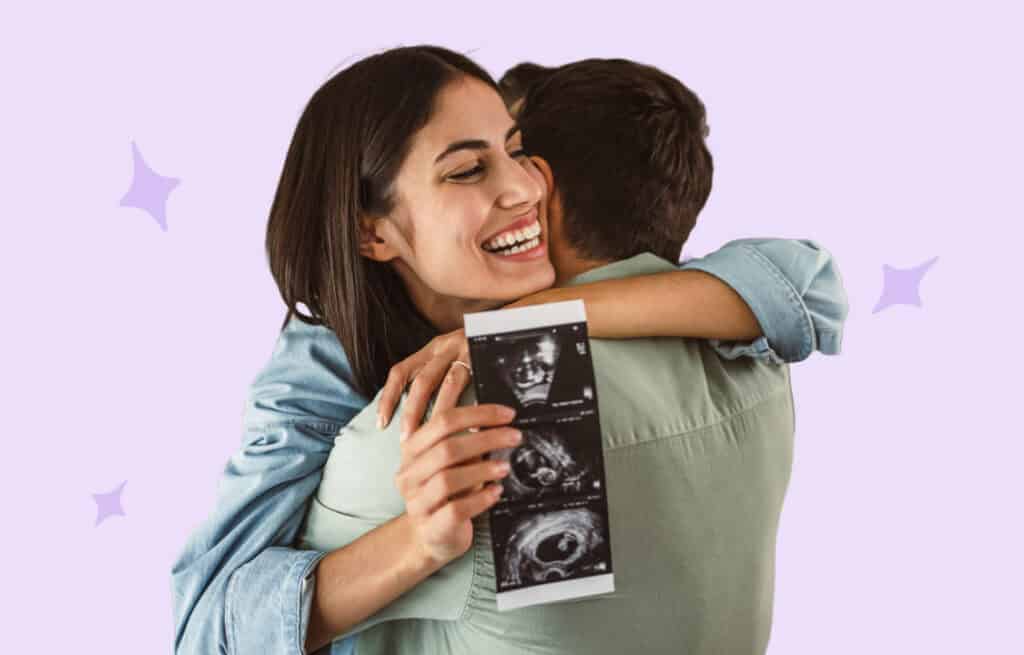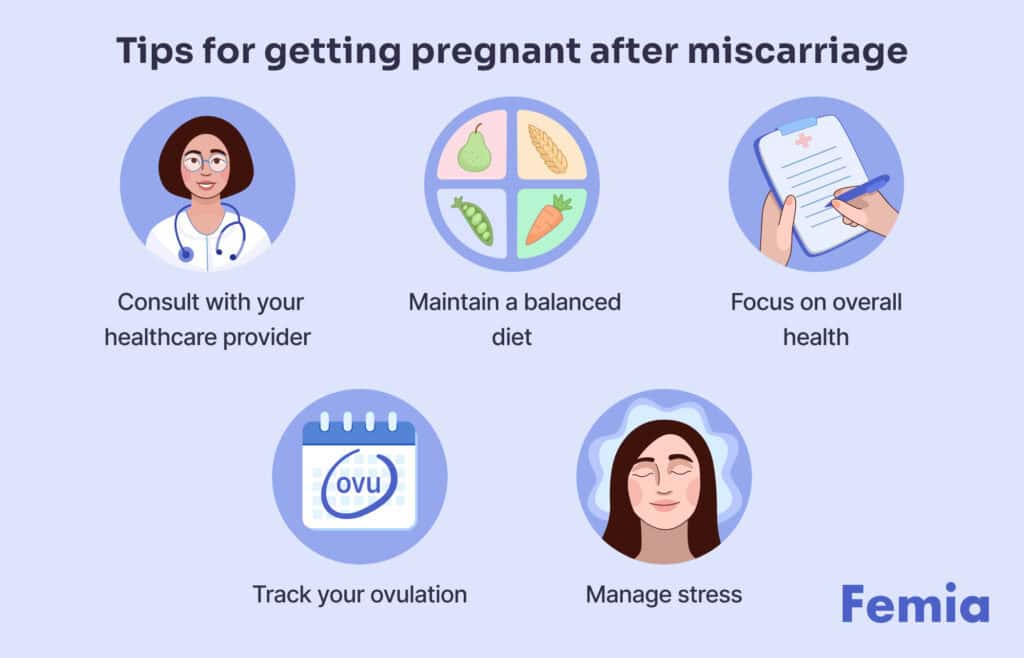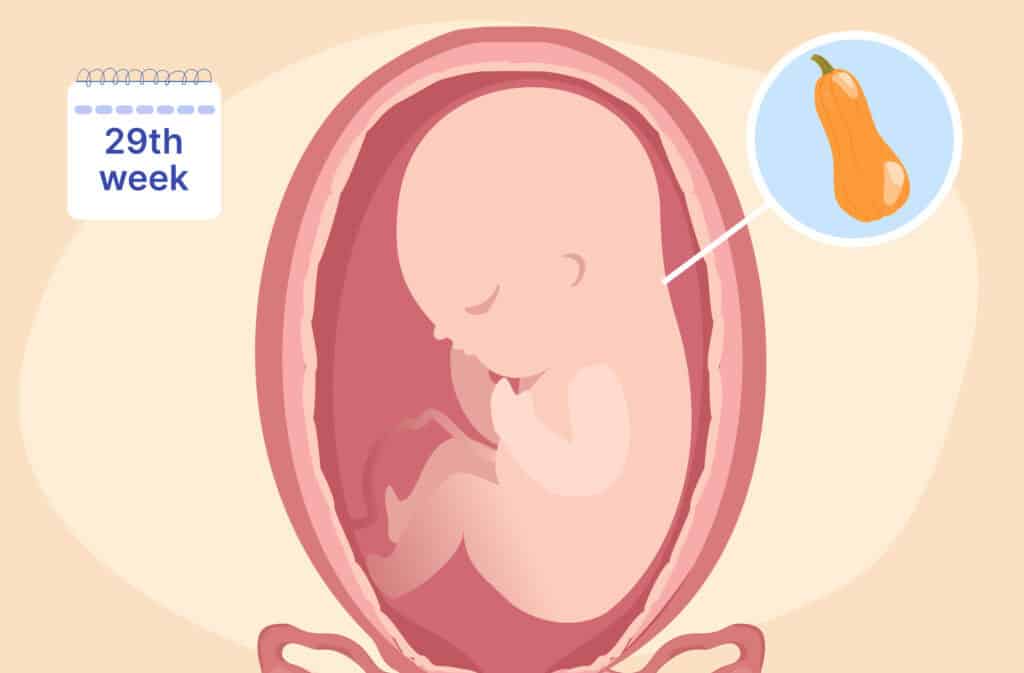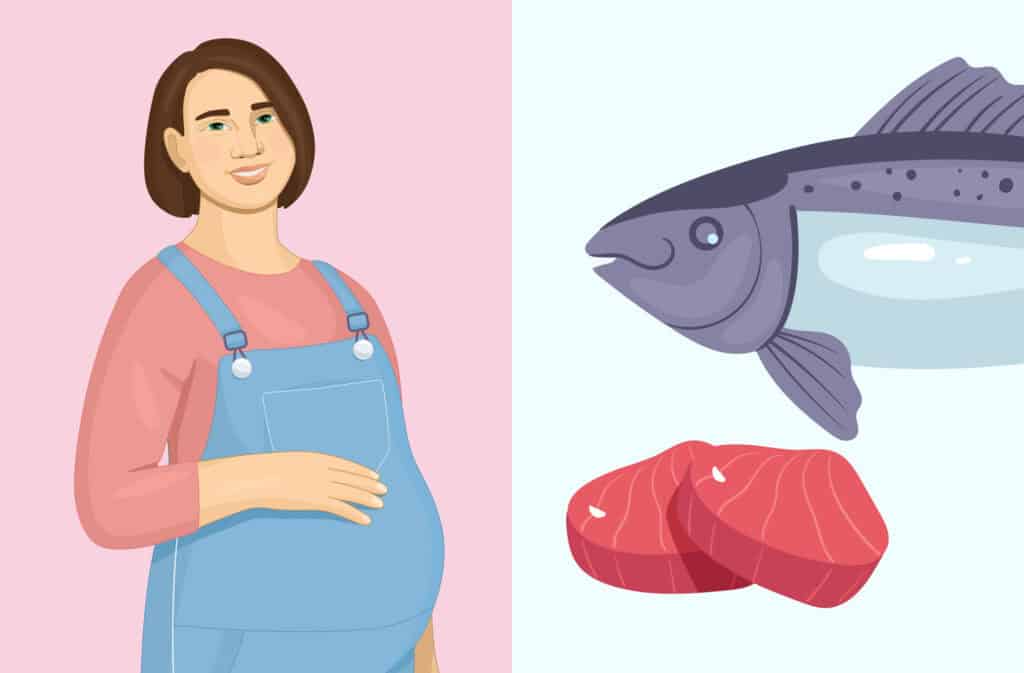Femia > Health Library > Getting Pregnant > Challenges > Pregnancy after miscarriage: Fertility, timing, and emotional recovery
Pregnancy after miscarriage: Fertility, timing, and emotional recovery

- Updated Feb 11, 2025
- Published
CRAFTED BY HUMAN
Crafted by human At Femia, we provide accurate and up-to-date information at every stage of your journey, from trying to conceive, pregnancy and postnatal support. All content is created by a real person based on in-depth research and own professional experience. Femia ensures that you will receive expert advice, strict accuracy and a personalized approach from our authors/medical experts. Learn more about our editorial policy.
FACT CHECKED
Fact checked At Femia Health, we maintain the highest standards of editorial excellence in delivering content focused on helping you conceive, guiding you through pregnancy, and supporting you postpartum. Explore our content review principles to learn how we ensure the accuracy and quality of our health and lifestyle tips for every stage of your journey.
Yes, getting pregnant after a miscarriage is possible. Some women may even experience increased fertility following a miscarriage. If you’ve experienced a miscarriage, make sure you prioritize emotional and physical recovery. You should take time to heal. This process may include steps to manage your stress, including, for example, using breathing techniques, speaking with your loved ones, practicing yoga, focusing on a balanced diet, and tracking ovulation.
Miscarriage is an emotionally painful experience. It may take time to process your emotions.l You may also be thinking about the next pregnancy, and whether you want to try again. While yes, the majority of women can get pregnant after a miscarriage and can even sometimes be more fertile, it’s crucial to consider both your emotional and physical readiness.
You may really want a child, but, as a result of your loss, fear may cause you to experience, for example, emotional blockage, making it harder to have sex and to become pregnant again. There are many reasons why emotional health plays an essential role in how the new try will go.
Femia has helped thousands of women after a miscarriage
optimize their fertility
Pregnancy after miscarriage: Is it possible?
Yes, pregnancy after a miscarriage is very possible, and the majority of women can go on to have healthy, successful pregnancies even after multiple miscarriages. According to Henry Mayo Newhall Hospital, over 85% of women who suffered one miscarriage and more than 75% after two miscarriages went on to conceive again and have a successful pregnancy.
The emotional impact of miscarriage may involve grief, sadness, and even fear about trying again. That’s why it is important to take the time to process those feelings before trying again. Everyone’s journey is unique, and some may feel ready for pregnancy after miscarriage sooner than others.
It’s also vital to ensure your body is psychically recovered and ready.
Consult a healthcare provider to get personalized recommendations. Doctors usually advise waiting for one or two menstrual cycles to allow the body to recover – although the amount of time can vary depending on individual circumstances.
👉Find out more: Sex after miscarriage: When is it safe to resume intimacy?
Are you more fertile after a miscarriage?
Although there is a common belief that women become super fertile after miscarriage, it isn’t an ironclad fact in all cases. There is some truth to it however – a study published by the Fertility and Sterility medical portal found that women who had a biochemical miscarriage or a positive pregnancy test followed by a late period (which is considered a very early miscarriage) were much more likely to conceive 1-3 months afterward.
However, there is a controversial study by the journal Human Reproduction where researchers spoke with nearly 3,000 women looking to conceive. It observed that women who had had a miscarriage reported that it took longer for them to conceive a subsequent pregnancy.
From this, we can conclude that there is no universal answer for everyone, and either increased or decreased fertility will depend on many personal factors.
You can get pregnant as soon as you start ovulating again. Most women start ovulating about two weeks after a miscarriage, although it might take longer for some. While ovulation and higher hormone levels may increase the chances of successful conception, experts recommend waiting longer to ensure you are physically and mentally ready and to conduct a follow-up examination. This is especially important in cases of repeated miscarriage or if the pregnancy was not a chemical one.
Why is it so easy to get pregnant after a miscarriage?
Some women conceive relatively quickly after a miscarriage, and this can be due to several factors involving the body’s natural reproductive processes.
Rapid normalization of hormone levels
After a miscarriage, hormone levels, including human chorionic gonadotropin (hCG), decrease, and over 4–6 weeks, hCG completely disappears from the body, signaling that a new cycle can begin.
The endometrial lining may also recover quickly
This means there is a favorable environment for embryo implantation. This swift return to normal reproductive function means that some women may find themselves super fertile after miscarriage.
Remember that each woman’s body is unique; while some may experience fertility in two weeks, others may take more time and be absolutely healthy.
Successful pregnancy immediately after miscarriage: Is it common?
Statistics show that most women will go on to have a healthy pregnancy after miscarriage. According to the Mayo Clinic, less than 5% of women will have two, while only 1% will have three or more consecutive miscarriages.
One of the main factors affecting the likelihood of having another miscarriage is age. The older you are, the higher the chances of another loss.
While this is true, it’s important to remember that there are still many medical options, and proactive consultation can help increase the chances of successful childbirth in older women.
Age plays a key role in conception in general as an embryo is more likely to have abnormalities with its chromosomes in older parents, reducing the chances of implantation and survival.
Tips for getting pregnant after miscarriage

Experiencing a miscarriage can be emotionally challenging, but many people go on to have healthy pregnancies afterward. When you feel ready, here are some tips to consider that can help increase your chances of conceiving again:
1. Consult with your healthcare provider
Before you start trying to get pregnant, it’s crucial to first consult a healthcare provider. A doctors can evaluate your case, assess if your body has fully recovered, and determine if there are any underlying health issues to address.
Medical advice on when to try again will depend on many personal factors, but in general, it is recommended to wait until at least one complete menstrual cycle has passed. This is recommended in order to give your body time to reset hormonally and ensure that the uterus is ready for a new pregnancy.
2. Track your ovulation
Tracking ovulation can aid you in getting pregnant after miscarriage. You can use ovulation predictor kits, track basal body temperature, and monitor cervical mucus to identify the best days for conceiving. In some cases the cycle stabilizes within two weeks, others may need a few months to get the normal menstrual cycle back. By tracking, it will be easier to predict ovulation.
3. Manage stress
Miscarriage is often a deeply emotional experience and the stress you experience can also impact ovulation and hormonal balance. If you’re experiencing a great deal of stress, make sure you seek professional help, talk to your partner, or to your family or friends to get emotional support before trying once again. You may want to consider activities to help ease the pain and reduce your stress. Some examples of activitiess that can help include:
- Meditation
- Yoga
- Support groups
- Journaling
4. Maintain a balanced diet
Your diet influences hormone levels and fertility as well. A nutrient-rich diet will help your body get enough vitamins and minerals for it to maintain healthy reproductive and overall health.
Focus on whole foods that support reproductive health, these may include:
- Leafy greens (spinach, kale, bok choy, collard greens)
- Lean proteins (chicken breast, greek yogurt, egg, tofu)
- Whole grains (red rice, brown rice, quinoa, bulgur)
- Foods rich in vitamins C, D, E, and folate (fatty fish, strawberries, almonds and legumes)
These nutrients play essential roles in hormone regulation and egg quality. You may also want to discuss prenatal vitamins with your healthcare provider, as this supplement supports your body’s nutritional needs during this time.
👉Find out more: Which food can cause miscarriage: A comprehensive guide
5. Focus on overall health
It’s important to manage your overall health. Consider avoiding smoking, alcohol, and caffeine. Maintain a regular, gentle exercise routine to keep your body in good health.
Coping emotionally while trying again
Pregnancy after miscarriage takes courage and strength, as the process is emotionally and physically demanding. As you are doing an incredibly difficult thing – pursuing your goal of having a baby, consider the following tips to help yourself get through this time:
- Journaling and writing positive coping statements help reduce uncertainty and calm anxiety in early pregnancy.
- Some women find pregnancy yoga helpful for managing emotions. You can also consider other relaxation techniques like hypnotherapy and meditation.
- Breathing techniques are great and can be used anywhere if you experience sudden anxiety.
- You don’t want to be alone during this time, so make sure your loved ones know how you feel and how they can help you manage your stress. It could be spending time together, performing acts of love and kindness, or just being available to listen. Either to supplement this, or if you don’t feel you have someone that you can freely express your feelings too, you can also consider seeking professional support.
- Take care of yourself. Do things that bring you joy or make you feel calmer. Whether it’s walking, your favorite hobby, or something new, find things that make you feel happier and create a routine.
- Do not push yourself to cope with everything right away. Consider taking time off work or talking to your manager about reducing the workload while you are healing.
Femia has helped thousands of women after a miscarriage
optimize their fertility
Questions from the Femia community
How long should I wait to try again after a miscarriage?
The answer will depend on many personal factors, so it's best to get personalized medical guidance. However, in general, it's recommended to wait 1-3 months. Please remember that everything will depend on your emotional and physical recovery.
What are my chances of having another miscarriage?
Statistics show that the majority of women who previously had one miscarriage go on to have a healthy pregnancy, while the risk of recurrent miscarriage is relatively low.
How can I prepare my body for pregnancy after a miscarriage?
It's crucial to first let the body and mind heal from the trauma. Consult a healthcare provider to get personal guidance. Manage stress using breathing techniques, yoga, or seeking support from loved ones. Focus on a healthy diet, add gentle exercises to your daily routine, and consider taking prenatal vitamins.
Сan you get pregnant right after a miscarriage?
The short answer is yes. Most women successfully conceive and carry a healthy baby after a miscarriage. Age will play a crucial factor in success rates, but proactively consulting a healthcare provider will increase your chances.
The bottom line
Pregnancy after miscarriage is achievable, and many women go on to have healthy pregnancies afterward. Taking time to heal emotionally and physically is crucial, as is consulting a healthcare provider to determine the best time to start trying again. Each journey is unique, and a mindful approach to recovery can increase the chances of a positive outcome in the next pregnancy attempt.
References
- “Pregnancy after a Miscarriage.” Henrymayo.com, 2021, www.henrymayo.com/news-publications/news/2021/pregnancy-after-a-miscarriage/. Accessed 7 Oct. 2024.
- “Redirecting.” Elsevier.com, 2024, linkinghub.elsevier.com/retrieve/pii/S0015028202046940. Accessed 7 Oct. 2024.
- Betz, Danielle, and Kathleen Fane. “Human Chorionic Gonadotropin (HCG).” National Library of Medicine, StatPearls Publishing, 2019, www.ncbi.nlm.nih.gov/books/NBK532950/.
- Mayo Clinic. “Miscarriage – Diagnosis and Treatment – Mayo Clinic.” Mayoclinic.org, 2019, www.mayoclinic.org/diseases-conditions/pregnancy-loss-miscarriage/diagnosis-treatment/drc-20354304.
- Mayo Clinic. “Miscarriage – Diagnosis and Treatment – Mayo Clinic.” Mayoclinic.org, 2019, www.mayoclinic.org/diseases-conditions/pregnancy-loss-miscarriage/diagnosis-treatment/drc-20354304.
- Hassold, Terry, and Patricia Hunt. “Maternal Age and Chromosomally Abnormal Pregnancies: What We Know and What We Wish We Knew.” Current Opinion in Pediatrics, vol. 21, no. 6, Dec. 2009, pp. 703–708, https://doi.org/10.1097/mop.0b013e328332c6ab.
- NHS. “Breathing Exercises for Stress.” Nhs.uk, 2 Feb. 2021, www.nhs.uk/mental-health/self-help/guides-tools-and-activities/breathing-exercises-for-stress/.
- OUP Academic: Is previous aberrant reproductive outcome predictive of subsequently reduced fecundity?, March 01, 2005, https://academic.oup.com/humrep/article/20/3/657/2356567.

Discover the top fertility-boosting foods and a 7-day fertility diet meal plan to increase your chances of conceiving. Learn what to eat and avoid when trying to get pregnant.

Discover what happens at 29 weeks pregnant, from baby development and symptoms to contraction tips and self-care advice.

Wondering if pregnant women can eat tuna? Learn about the safety of canned tuna, recommended portions, and what types of tuna to eat during pregnancy.

